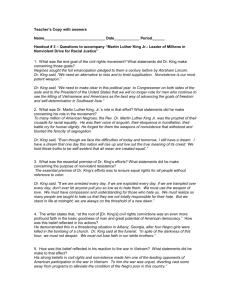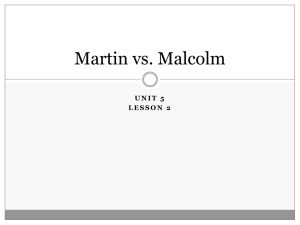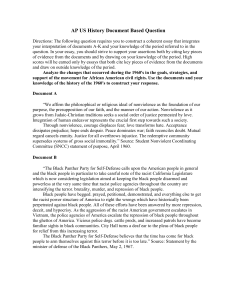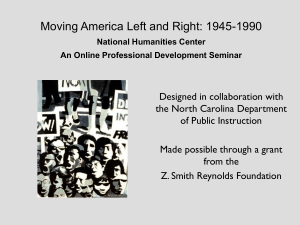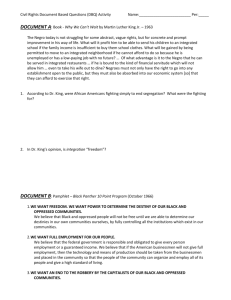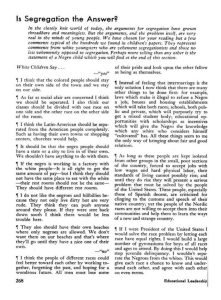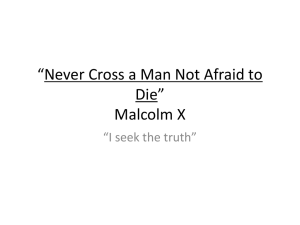Presentation
advertisement
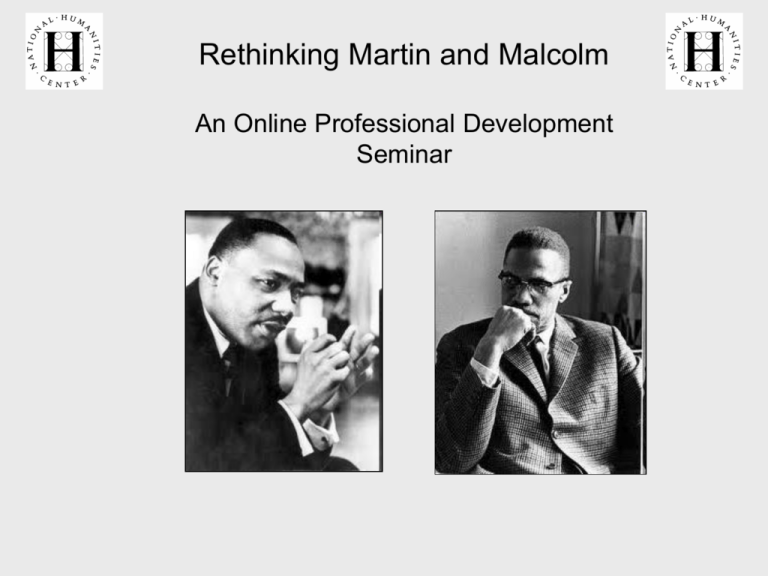
Rethinking Martin and Malcolm An Online Professional Development Seminar GOALS Deepen your understanding of the Civil Rights Movement and the black freedom struggle as represented by Martin Luther King, Jr. and Malcolm X. Compare and contrast the objectives and strategies pursued by King and Malcolm X and rethink their relationship to each other. Introduce primary sources that you can use in your teaching. Steven F. Lawson National Humanities Center Fellow 1987-88 Professor Emeritus of History Rutgers University History of the Civil Rights Movement Running for Freedom: Civil Rights and Black Politics in America Since 1941, 3rd edition (2009) Civil Rights Crossroads: Nation, Community, and the Black Freedom Struggle (2003) Black Ballots: Voting Rights in the South, 1944-1969 (1999) In Pursuit of Power: Southern Blacks and Electoral Politics, 1965-1982 (1985) Debating the Civil Rights Movement (with Charles Payne) (1998) Rethinking Martin and Malcolm Overview Differences Integration vs. Nationalism Nonviolence vs. Any Means Necessary Christianity vs. Islam Redemption vs. Revenge Consensus vs. Polarization, Hope vs. Fear Middle-Class Respectability vs. Working-Class Poor Rhetorical Tone Similarities Importance of Religion Recognition of Structural Interconnectedness of Racism, Poverty, and Imperialism Belief in Active Resistance Recognition of Tenacity of White Racism Goals of Freedom, Pluralism, Black Dignity and Pride Importance of the Ballot, Economic Opportunity and Development Inspirational (Charismatic) Leadership Targets of Government Surveillance and Repression Sexism Rethinking Martin and Malcolm Overview Importance of Context King: Pre and Post 1965 Malcolm X: Pre and Post Early 1950s and Pre and Post 1964 Interconnectedness “Good Cop vs. Bad Cop” Myths King the dreamer, the White Man’s Negro Malcolm X the Proponent of Aggressive Violence They Were Irreconcilable Opponents By the End of Their Lives They Had Totally Transformed Themselves Martin Luther King, Jr, Stride Toward Freedom, 1958. ”When I went to Montgomery as a pastor, I had not the slightest idea that I would later become involved in a crisis in which nonviolent resistance would be applicable. I neither started the protest nor suggested it. I simply responded to the call of the people for a spokesman. When the protest began, my mind, consciously or unconsciously, was driven back to the Sermon on the Mount, with its sublime teachings on love, and the Gandhian method of nonviolent resistance. As the days unfolded, I came to see the power of nonviolence more and more. Living through the actual experience of the protest, nonviolence became more than a method to which I gave intellectual assent; it became a commitment to a way of life. Many of the things that I had not cleared up intellectually concerning nonviolence were now solved in the sphere of practical action.” Discussion Question In explaining King’s core values, how much weight would you give to religion, philosophy, and practical experience? Malcolm X, The Autobiography, 1966 “The white people I had known marched before my mind’s eye. From the start of my life. The state white people always in our house after the other whites I didn’t know had killed my father . . . the white people who kept calling my mother ‘crazy’ to her face and before me and my brothers and sisters, until she finally was taken off by white people to the Kalamazoo asylum. . . the white judge and others who had split up the children . . . the Swerlins, the other whites around Mason . . . white youngsters I was in school with, and the teachers—the one who told me in the eighth grade to “be a carpenter” because thinking of being a lawyer was foolish for a Negro . . . .” Discussion Question In explaining Malcolm X’s core values, how much weight would you give to religion, philosophy, and practical experience? Martin Luther King, Jr., “Letter from Birmingham Jail,” 1963 “We have waited for more than 340 years for our constitutional and God given rights. The nations of Asia and Africa are moving with jet like speed toward gaining political independence, but we still creep at horse and buggy pace toward gaining a cup of coffee at a lunch counter. Perhaps it is easy for those who have never felt the stinging darts of segregation to say, "Wait." But when you have seen vicious mobs lynch your mothers and fathers at will and drown your sisters and brothers at whim; when you have seen hate filled policemen curse, kick and even kill your black brothers and sisters; when you see the vast majority of your twenty million Negro brothers smothering in an airtight cage of poverty in the midst of an affluent society; when you suddenly find your tongue twisted and your speech stammering as you seek to explain to your six year old daughter why she can't go to the public amusement park that has just been advertised on television, and see tears welling up in her eyes when she is told that Funtown is closed to colored children, and see ominous clouds of inferiority beginning to form in her little mental sky, and see her beginning to distort her personality by developing an unconscious bitterness toward white people; when you have to concoct an answer for a five year old son who is asking: "Daddy, why do white people treat colored people so mean?"; when you take a cross country drive and find it necessary to sleep night after night in the uncomfortable corners of your automobile because no motel will accept you; when you are humiliated day in and day out by nagging signs reading "white" and "colored"; when your first name becomes "nigger," your middle name becomes "boy" (however old you are) and your last name becomes "John," and your wife and mother are never given the respected title "Mrs."; when you are harried by day and haunted by night by the fact that you are a Negro, living constantly at tiptoe stance, never quite knowing what to expect next, and are plagued with inner fears and outer resentments; when you are forever fighting a degenerating sense of "nobodiness"--then you will understand why we find it difficult to wait. There comes a time when the cup of endurance runs over, and men are no longer willing to be plunged into the abyss of despair. I hope, sirs, you can understand our legitimate and unavoidable impatience.” Discussion Question How would King respond to the charge that nonviolent confrontations provoked violent reactions? Malcolm X, “Message to the Grass Roots,” 1963 “So I cite these various revolutions, brothers and sisters, to show you -- you don't have a peaceful revolution. You don't have a turn-the-other-cheek revolution. There's no such thing as a nonviolent revolution. [The] only kind of revolution that's nonviolent is the Negro revolution. The only revolution based on loving your enemy is the Negro revolution. The only revolution in which the goal is a desegregated lunch counter, a desegregated theater, a desegregated park, and a desegregated public toilet; you can sit down next to white folks on the toilet. That's no revolution. Revolution is based on land. Land is the basis of all independence. Land is the basis of freedom, justice, and equality.” Discussion Question Is Malcolm X correct that no revolution can be nonviolent? How would King respond? Martin Luther King, Jr., “Letter from Birmingham Jail,” 1963 “You speak of our activity in Birmingham as extreme. At first I was rather disappointed that fellow clergymen would see my nonviolent efforts as those of an extremist. I began thinking about the fact that I stand in the middle of two opposing forces in the Negro community. One is a force of complacency, made up in part of Negroes who, as a result of long years of oppression, are so drained of self respect and a sense of "somebodiness" that they have adjusted to segregation; and in part of a few middle-class Negroes who, because of a degree of academic and economic security and because in some ways they profit by segregation, have become insensitive to the problems of the masses. The other force is one of bitterness and hatred, and it comes perilously close to advocating violence. It is expressed in the various black nationalist groups that are springing up across the nation, the largest and best known being Elijah Muhammad's Muslim movement. Nourished by the Negro's frustration over the continued existence of racial discrimination, this movement is made up of people who have lost faith in America, who have absolutely repudiated Christianity, and who have concluded that the white man is an incorrigible "devil." . . .I have tried to stand between these two forces, saying that we need emulate neither the "do nothingism" of the complacent nor the hatred and despair of the black nationalist. For there is the more excellent way of love and nonviolent protest. I am grateful to God that, through the influence of the Negro church, the way of nonviolence became an integral part of our struggle” Discussion Question How does King use the Nation of Islam to promote his own goals? Malcolm X, “Message to the Grass Roots,” 1963 “This modern house Negro loves his master. He wants to live near him. He'll pay three times as much as the house is worth just to live near his master, and then brag about "I'm the only Negro out here." "I'm the only one on my job." "I'm the only one in this school." You're nothing but a house Negro. And if someone comes to you right now and says, "Let's separate," you say the same thing that the house Negro said on the plantation. "What you mean, separate? From America? This good white man? Where you going to get a better job than you get here?" I mean, this is what you say. "I ain't left nothing in Africa," that's what you say. Why, you left your mind in Africa.” Discussion Question How does Malcolm X use King to promote his goals? Martin Luther King Jr., “Give us the Ballot,” 1957 “Give us the ballot, and we will no longer have to worry the federal government about our basic rights. Give us the ballot , and we will no longer plead to the federal government for passage of an anti-lynching law; we will by the power of our vote write the law on the statute books of the South and bring an end to the dastardly acts of the hooded perpetrators of violence. Give us the ballot, and we will transform the salient misdeeds of bloodthirsty mobs into the calculated good deeds of orderly citizens. Give us the ballot, and we will fill our legislative halls with men of goodwill and send to the sacred halls of Congress men who will not sign a "Southern Manifesto" because of their devotion to the manifesto of justice. Give us the ballot, and we will place judges on the benches of the South who will do justly and love mercy, and we will place at the head of the southern states governors who will, who have felt not only the tang of the human, but the glow of the Divine. Give us the ballot, and we will quietly and nonviolently, without rancor or bitterness, implement the Supreme Court's decision of May seventeenth, 1954 [Brown v. Board of Education].” Discussion Question What assumptions does King make about the casting of a ballot? Malcolm X, “The Ballot or the Bullet,” 1964 “It was the black man's vote that put the present administration in Washington, D.C. Your vote, your dumb vote, your ignorant vote, your wasted vote put in an administration in Washington, D.C., that has seen fit to pass every kind of legislation imaginable, saving you until last, then filibustering on top of that. And your and my leaders have the audacity to run around clapping their hands and talk about how much progress we're making. And what a good president we have. If he wasn't good in Texas, he sure can't be good in Washington, D.C. Because Texas is a lynch state. It is in the same breath as Mississippi, no different; only they lynch you in Texas with a Texas accent and lynch you in Mississippi with a Mississippi accent. And these Negro leaders have the audacity to go and have some coffee in the White House with a Texan, a Southern cracker—that's all he is—and then come out and tell you and me that he's going to be better for us because, since he's from the South, he knows how to deal with the Southerners.” Discussion Question What assumptions does Malcolm X make about casting ballots? Compare them with those of King. Martin Luther King, Jr., “Give Us the Ballot,” 1957 “In the midst of these prevailing conditions, we come to Washington today pleading with the president and members of Congress to provide a strong, moral, and courageous leadership for a situation that cannot permanently be evaded. We come humbly to say to the men in the forefront of our government that the civil rights issue is not an ephemeral, evanescent domestic issue that can be kicked about by reactionary guardians of the status quo; it is rather an eternal moral issue which may well determine the destiny of our nation in the ideological struggle with communism. The hour is late. The clock of destiny is ticking out. We must act now, before it is too late.” Discussion Question What strategies does King use to make his point? Malcolm X, “The Ballot or the Bullet,” 1964 “And now you're facing a situation where the young Negro's coming up. They don't want to hear that turn the-other-cheek stuff, no. In Jacksonville, those were teenagers, they were throwing Molotov cocktails. Negroes have never done that before. But it shows you there's a new deal coming in. There's new thinking coming in. There's new strategy coming in. It'll be Molotov cocktails this month, hand grenades next month, and something else next month. It'll be ballots, or it'll be bullets. It'll be liberty, or it will be death. The only difference about this kind of death—it'll be reciprocal. You know what is meant by reciprocal? . . . I don't usually deal with those big words because I don't usually deal with big people. I deal with small people. I find you can get a whole lot of small people and whip hell out of a whole lot of big people. They haven't got anything to lose, and they've got every thing to gain. And they'll let you know in a minute: It takes two to tango; when I go, you go.” Discussion Question What strategies does Malcolm X use to make his point? Martin Luther King, Jr., “The Ethical Demands of Integration,” 1962 “The word segregation represents a system that is prohibitive: it denies the Negro equal access to schools, parks, restaurants, libraries, and the like. Desegregation is eliminative and negative, for it simply removes these legal and social prohibitions. Integration is creative, and is therefore more profound and far reaching than desegregation. Integration is the positive acceptance of desegregation and the welcomed participation of Negroes in the total range of human activities. Integration is genuine intergroup, interpersonal doing. Desegregation, then, rightly is only a short-range goal. Integration is the ultimate goal of our national community. Discussion Question How can King’s view of integration be considered a radical objective? Malcolm X, “The Ballot or the Bullet” 1964 “Let me explain what I mean. A segregated district or community is a community in which people live, but outsiders control the politics and the economy of that community. They never refer to the white section as a segregated community. It's the all-Negro section that's a segregated community. Why? The white man controls his own school, his own bank, his own economy, his own politics, his own everything, his own community; but he also controls yours. When you're under someone else's control, you're segregated. They'll always give you the lowest or the worst that there is to offer, but it doesn't mean you're segregated just because you have your own. You've got to control your own. Just like the white man has control of his, you need to control yours.” You know the best way to get rid of segregation? The white man is more afraid of separation than he is of integration. Segregation means that he puts you away from him, but not far enough for you to be out of his jurisdiction; separation means you're gone. And the white man will integrate faster than he'll let you separate. So we will work with you against the segregated school system because it's criminal, because it is absolutely destructive, in every way imaginable, to the minds of the children who have to be exposed to that type of crippling education.” Discussion Question Compare Malcolm X’s analysis of segregation to that of King’s. Martin Luther King, Jr., “Where Do We Go From Here”? 1967 “The tendency to ignore the Negro's contribution to American life and to strip him of his personhood is as old as the earliest history books and as contemporary as the morning's newspaper. To upset this cultural homicide, the Negro must rise up with an affirmation of his own Olympian manhood. Any movement for the Negro's freedom that overlooks this necessity is only waiting to be buried. As long as the mind is enslaved, the body can never be free. Psychological freedom, a firm sense of self-esteem, is the most powerful weapon against the long night of physical slavery. No Lincolnian emancipation proclamation or Johnsonian civil rights bill can totally bring this kind of freedom. The Negro will only be free when he reaches down to the inner depths of his own being and signs with the pen and ink of assertive manhood his own emancipation proclamation. And, with a spirit straining toward true self-esteem, the Negro must boldly throw off the manacles of self-abnegation and say to himself and to the world, I am somebody. I am a person. I am a man with dignity and honor. I have a rich and noble history. How painful and exploited that history has been. Yes, I was a slave through my foreparents and I am not ashamed of that. I'm ashamed of the people who were so sinful to make me a slave. Yes, we must stand up and say, I'm black and I'm beautiful, and this self-affirmation is the black man's need, made compelling by the white man's crimes against him.” Discussion Question How does King’s thinking reflect that of Malcolm X? Malcolm X, “The Ballot or the Bullet,” 1964 “The economic philosophy of black nationalism is pure and simple. It only means that we should control the economy of our community. Why should white people be running all the stores in our community? Why should white people be running the banks of our community? Why should the economy of our community be in the hands of the white man? Why? If a black man can't move his store into a white community, you tell me why a white man should move his store into a black community. The philosophy of black nationalism involves a re-education program in the black community in regards to economics. Our people have to be made to see that any time you take your dollar out of your community and spend it in a community where you don't live, the community where you live will get poorer and poorer, and the community where you spend your money will get richer and richer.” Discussion Question How would King respond to this argument? Martin Luther King, Jr., “Where Do We Go From Here?” 1967 “It is perfectly clear that a violent revolution on the part of American blacks would find no sympathy and support from the white population and very little from the majority of Negroes themselves. This is no time for romantic illusions and empty philosophical debates about freedom. This is a time for action. What is needed is a strategy for change, a tactical program that will bring the Negro into the mainstream of American life as quickly as possible. So far, this has only been offered by the nonviolent movement. Without recognizing this we will end up with solutions that don't solve, answers that don't answer and explanations that don't explain. And so I say to you today that I still stand by nonviolence. And I am still convinced that it is the most potent weapon available to the Negro in his struggle for justice in this country. And the other thing is that I am concerned about a better world. I'm concerned about justice. I'm concerned about brotherhood. I'm concerned about truth. And when one is concerned about these, he can never advocate violence. For through violence you may murder a murderer but you can't murder murder. Through violence you may murder a liar but you can't establish truth. Through violence you may murder a hater, but you can't murder hate. Darkness cannot put out darkness. Only light can do that.” Discussion Question Why does King continue to oppose violence? Malcolm X, “The Ballot or the Bullet,” 1964 “Last but not least, I must say this concerning the great controversy over rifles and shotguns. The only thing that I've ever said is that in areas where the government has proven itself either unwilling or unable to defend the lives and the property of Negroes, it's time for Negroes to defend themselves. Article number two of the constitutional amendments provides you and me the right to own a rifle or a shotgun. It is constitutionally legal to own a shotgun or a rifle. This doesn't mean you're going to get a rifle and form battalions and go out looking for white folks, although you'd be within your rights—I mean, you'd be justified; but that would be illegal and we don't do anything illegal. If the white man doesn't want the black man buying rifles and shotguns, then let the government do its job.” Discussion Question Under what circumstances does Malcolm X condone violence? What would King say? Martin Luther King, Playboy Interview, 1965 “The world is now so small in terms of geographic proximity and mutual problems that no nation should stand idly by and watch another’s plight. I think that in every possible instance Africans should use the influence of their governments to make it clear that the struggle of their brothers in the U.S. is part of a worldwide struggle. In short, injustice anywhere is a threat to justice everywhere, for we are tied together in a garment of mutuality. What happens in Johannesburg affects Birmingham, however indirectly. We are descendants of the Africans. Our heritage is Africa. We should never seek to break the ties, nor should the Africans.” Malcolm X, “The Ballot or the Bullet,” 1964 “When we begin to get in this area, we need new friends, we need new allies. We need to expand the civil-rights struggle to a higher level—to the level of human rights. Whenever you are in a civil-rights struggle, whether you know it or not, you are confining yourself to the jurisdiction of Uncle Sam. No one from the outside world can speak out in your behalf as long as your struggle is a civilrights struggle. Civil rights comes within the domestic affairs of this country. All of our African brothers and our Asian brothers and our Latin-American brothers cannot open their mouths and interfere in the domestic affairs of the United States. And as long as it's civil rights, this comes under the jurisdiction of Uncle Sam.” Discussion Question In what ways do Martin Luther King and Malcolm X share common ground? In what ways do they differ? Final slide. Thank You.
